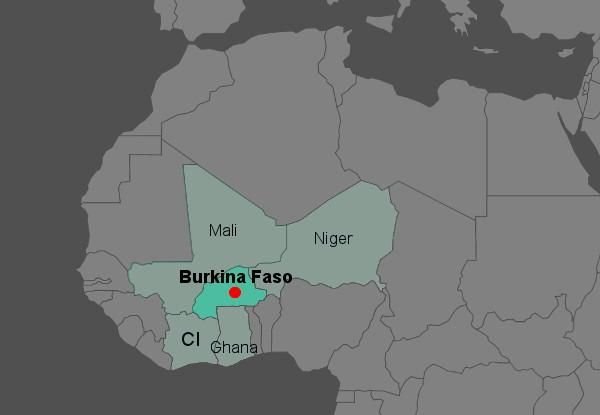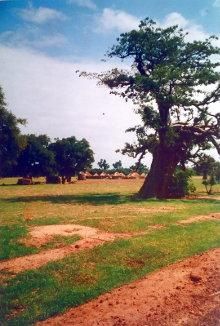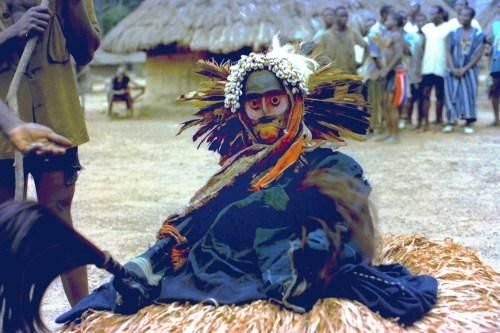Encounters with Africa: From Bobo to Ouagadougou, by @terresco (translated from French)
This is an authorized translation in English of a post in French by @terresco: Rencontres avec l'Afrique: De Bobo à Ouagadougou
As my primary language is not English, there are probably some mistakes in my translation.
Remember that the person who speaks here is NOT me, Vincent Celier (@vcelier), but @terresco, a French guy.

Burkina Faso
Leaving Abidjan with the bush train to attend the bi annual festival of African cinema, we traveled to Bobo-Dioulasso. Curiosity had made us leave our railroad fellow passengers to visit the second city of Burkina Faso. The train had not waited for us and we continued our way by bush taxi. Chance had seated me to the right of an old man in traditional dress with a keen and intelligent look. I immediately noticed his charisma when he put his eyes on us to ask if the seat was free.
We immediately engaged in an exciting conversation, it was so rich that it greatly shortened a trip sometimes monotonous.
The African Che Guevara

I was interested in Sankara, even before knowing Africa. Anti-imperialist, pan-Africanist, involved in the movement of the non-aligned countries of the seventies. He criticized the neo-colonialism, of France, had traveled to the USSR and Cuba. A follower of participatory democracy, he set up new structures. Challenging the country's debt in one of his most famous speeches he defended the right to water and food, the right to be educated. Inside Sankara tries to fight against the traditional powers, seeks to diminish the weight of the tribes, to give more efficiency to the state.
When one is interested in West Africa or the revolutionary movements, it is essential to read a little bit about its history, easy to find, and better documented than I can do. But Sankara brought to the revolution its African touch, exaggeration, humor, provocation and marketing before the time. He sold all the luxury cars of the government to replace them by Renault 5, lowered the salaries of senior officials and remove their privileges. He himself often traveled by moped, a very common means of transport, almost symbolic in Ouagadougou. I imagine the ministers in the hot and dusty streets of Ouagadougou, sweating in their R5.
The traditions
Our conversation sometimes drifted to the customs and the country itself. My traveling companion, a traditional chief in a northern village, knew them well. Burkina shares many traditions with its close neighbors. Masks are not meant to be entertaining, they often represent the spirit of an ancestor, are made by skilled craftsmen and sacralized during a ceremony. Dance or rather dances, traditional, play a major role and participate in all ceremonies. Many languages and ethnicities coexist in the country, I do not remember the exact number, about sixty. The family and the village also play a very strong role and despite Sankara the traditional power continues to be superimposed on the power of the state. Animism is omnipresent as in neighboring countries.

Ouagadougou and FESPACO
We knew that we had arrived in Ouagadougou when, stopped at a red light, we were surrounded by hundreds of mopeds. A bit like we can see in some Asian countries. The driver must be extremely careful not to touch any. The same moped can easily carry three people, chickens, a goat and some other goods.
Every two years, Burkina organizes a film festival (FESPACO), which over the years has enjoyed growing success. This festival has been an incubator for local artists, comedians, producers, writers, musicians ... At the time it was still small potatoes, there were certainly people, but on a human scale. We could find accommodations and enjoy the event. African cinema, too little known today, was at hand. Not Brazilian-like series, often coming from Nigeria. Real movies, often hard, African cinema is realistic, always moving. In the streets on all sides theatrical groups, sometimes interactive, always creative. Storytellers surrounded by a horde of children. Of course music and beer.
At that time AIDS was, unfortunately, in vogue. It was the theme of many artists. More than the tragedies engendered by the disease, the idea was to promote awareness to develop prevention. At that time, in West Africa we often met people who did not believe in AIDS, or who, in the image of my friend Juste whose story I told earlier, told me: "AIDS, it's white sickness. "
To finish on AIDS, a rather sad anecdote. The following years traveling in the Sahel people had a certain mistrust of us coming from Abidjan. It took me a long time to understand. In these poor areas many migrated to Abidjan to find work. They fell ill and returned to die in the village, but the point of view of those who remained was terrifying because they saw young people leaving either who did not come back or came back to die. I let you imagine the interpretation in this Africa where supernatural beliefs are common.
Burkina has had good times but not as much in my opinion as this extraordinary population deserved. Today, like its Sahelian neighbors, it suffers the installation of Islamist groups with regular attacks, including a very recent one.
-- @terresco
01: Encounters with Africa: Ivory Coast, by @terresco
02: Encounters with Africa: Abidjan, a daily pleasure, by @terresco
03: Encounters with Africa: The Tuaregs of Agadez, by @terresco
04: Encounters with Africa: The Tuaregs of Agadez, part 2, by @terresco
05: Encounters with Africa: On the way to the Dogon country, by @terresco
06: Encounters with Africa: Among the Dogon of Bandiagara, by @terresco
07: Encounters with Africa: The Gold Coast, by @terresco
08: Encounters with Africa: Where was born a desire to go elsewhere, by @terresco
09: Encounters with Africa: The time of failures, by @terresco
10: Encounters with Africa: The Promised Land, by @terresco
11: Encounters with Africa: The Land of the Upright Man, by @terresco
From Cape Town to Mombasa series:
01: Africa, the long crossing
02: From Cape Town to Mombasa: South Africa
03: From Cape Town to Mombasa: Namibia
04: From Cape Town to Mombasa: Botswana
05: From Cape Town to Mombasa: Zimbabwe
06: From Cape Town to Mombasa: Zimbabwe, part 2, by @terresco
07: From Cape Town to Mombasa: Zimbabwe, part 3, by @terresco
08: From Cape Town to Mombasa: Zambia, by @terresco
09: From Cape Town to Mombasa: Malawi, by @terresco
10: From Cape Town to Mombasa: Tanzania #1, by @terresco
11: From Cape Town to Mombasa: Tanzania #2, by @terresco
12: From Cape Town to Mombasa: Tanzania #3, by @terresco
13: From Cape Town to Mombasa: Tanzania #4, by @terresco
14: From Cape Town to Mombasa: Kenya, by @terresco
Really interesting, people who are dedicated to study, and share other cultures. I think that knowing other cultures is to integrate a piece more the life of those who experience it by becoming a more comprehensive and complete. I really congratulate you smell that publication, it's passion, it's art, it's experience. Many successes
Bonjour,
I just saw this blog under the hot post and I agree it belongs there. Thanks to you I have some reading for this weekend. I will read the French version too in order to foster my French skills and to get some impressions on.Africa.
Merci @vcelier
Greeting from Berlin, Germany @seelc
Such an informative post..
a good experience story @vcelier, at least I can understand how the socio-cultural situation of the people in your country, simply understand the situation that happened there and the history that exist, may peace be immediately created in this world.
Every nation has own tradition like as Burkina but I am shock of your last part of article that is AIDS. AIDS is a dangerous all over the globe the mostly in Africa. Thanks a lot